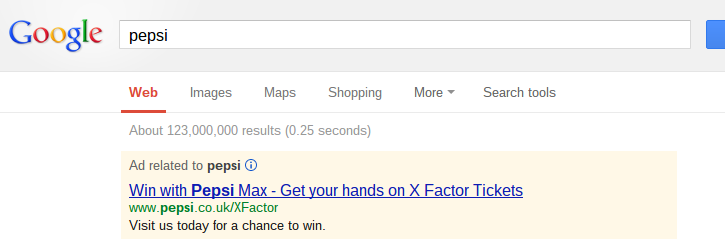I have analysed Nike, eBay, Apple and even . Now is the time to diversify the market I am looking at to the food and drinks industry with Pepsi. The fizzy drink market has always been a competitive market between Coca Cola and Pepsico. Coca Cola has always been that step ahead in gaining more market share. However, with a Coca Cola marketing disaster with them changing Coke’s taste to gain more market share, Pepsico has been reeling Coca Cola in. This was 20 years ago though! What are Pepsico trying to achieve through pay per click advertising on the internet nowadays?
When typing ‘pepsi’ into Google search results, the following advert appears:
Straight away, the lack of any other PPC adverts makes clear that no other competitor to Pepsi (even Coca Cola) want to advertise their product to Pepsi keywords. As well as this, it may also mean that Pepsi are bidding so high for their own brand names that there really is no point trying to outbid them for their own keywords.
With Pepsi being a worldwide brand name, there is no need for Pepsico to give any information about the company, company name or product. Every knows what Pepsi is and what it tastes like. For this reason, they have highlighted a competition instead. What I find interesting is that the competition is associated with a brand extension of Pepsi being Pepsi Max. This may imply that Pepsi Max isn’t as successful as the original Pepsi Cola. Therefore, the product needs a PPC advertising campaign boost to kick the brand extension into gear to make it become more successful.
Sometimes it is good to create PPC campaign with keywords to your own brand name. In doing so, you can:
- Promote specific sectors of your business which is exactly what Pepsi is doing with a competition involving Pepsi Max.
- Stamp your authority down to competitors. Competitors won’t bid for your keyword if they know the actual business is doing it themselves.
Below is the landing page of the Pepsi Max X Factor competition PPC advert:
When looking at the landing page for this PPC campaign, it is quite clear that Pepsico have adopted a lead capture page from looking at the different types of landing pages there are. Therefore, as well as promoting their product, they are gaining valuable market research about customers that drink Pepsi. It’s a win-win situation. If the web user clicks away from the landing page, Pepsico would have still advertised Pepsi Max to the web user. If the web user decided to take part in the competition as well as advertising Pepsico’s brand extensions, they will also be gaining information about their customers which could be used to advertise products through email marketing or in the post.





Stuart Draper
December 6, 2012 at 2:48 pm
Another reason competitors may not be bidding on Pepsi is because Google allows brands to protect who advertises on their trademarked name. I have helped companies fight that battle in the past. It actually isn’t very difficult, but you could be right, Will, it could simply be the reasons you mentioned and that they haven’t had to ask Google to block ads on their trademarked terms.
Will Green
December 10, 2012 at 11:57 am
Your view does sound more true to Pepsi. Big companies will be more likely to protect their brand against others. Due to this, competitors will be less likely to bid for other competitor’s brand names.